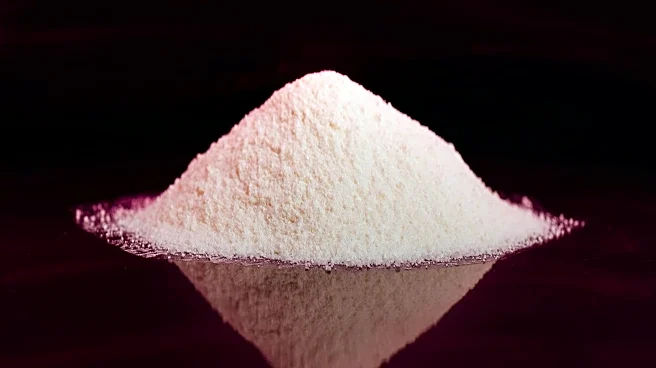What's Happening?
Consumer Reports has conducted an investigation revealing that over two-thirds of 23 tested protein powders contain lead levels exceeding the organization's daily safety standards. The nonprofit watchdog recommends a daily lead intake of no more than
0.5 micrograms, while the FDA maintains there is no known safe level of lead exposure. Unlike food products, the FDA does not regulate or vet supplements, including protein powders, before they are sold to the public, leaving consumers vulnerable to potential health risks. Plant-based protein powders were particularly problematic, with products like Naked Nutrition's Vegan Mass Gainer and Huel's Black Edition showing lead content so high that Consumer Reports advised against their consumption. Other products, such as Garden of Life's Sport Organic Plant-Based Protein and Momentous' 100% Plant Protein, contained enough lead to warrant limiting intake to once a week. Manufacturers have defended their products, citing different safety thresholds and testing methods.
Why It's Important?
The findings from Consumer Reports underscore the urgent need for stricter regulation and transparency in the supplement industry to protect consumer health. With the FDA not regulating supplements before they reach the market, consumers are at risk of exposure to harmful substances like lead, which can have serious health implications. This situation highlights a significant gap in public health policy, as dietary supplements are widely consumed for health and fitness purposes. The report may prompt calls for legislative action to ensure that supplements are subject to the same rigorous safety standards as food products, potentially leading to improved consumer safety and industry accountability.
What's Next?
The revelation of unsafe lead levels in protein powders may lead to increased scrutiny from regulatory bodies and consumer advocacy groups. There could be pressure on the FDA to implement more stringent regulations and oversight for dietary supplements. Manufacturers might face demands to reformulate their products to meet safer standards, and consumers may become more cautious about supplement choices, seeking products with verified safety certifications. Additionally, this issue could spark broader discussions about the need for comprehensive reform in the supplement industry, potentially influencing future policy decisions.
Beyond the Headlines
The report raises ethical questions about the responsibility of manufacturers to ensure product safety and transparency. It also highlights the cultural reliance on supplements for health and fitness, which may not always align with safety standards. Long-term, this could lead to shifts in consumer behavior, with increased demand for products that are independently verified for safety. The situation may also encourage innovation in the industry, as companies strive to develop safer, more transparent products to regain consumer trust.















